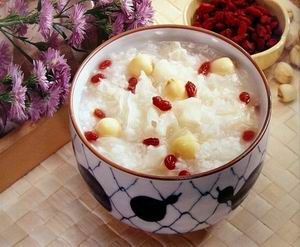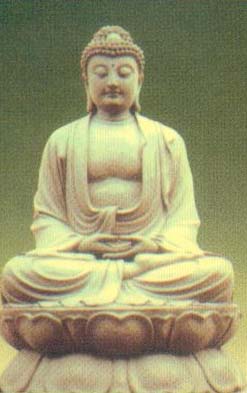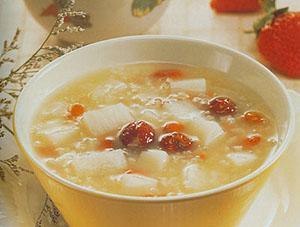又到腊八粥飘香(通讯员投稿)
[ 2007-01-25 14:16 ]
|
腊月初八,我国人民有吃腊八粥习俗。据说腊八粥传自印度,和佛教始祖释迦牟尼有关。释迦牟尼本是古印度北部迦毗罗卫国(今尼泊尔境内)净饭王的儿子,他见众生受生老病死等痛苦折磨,又不满当时婆罗门的神权统治,舍弃王位,出家修道。初无收获,后经六年苦行,于腊月八日在菩提树下悟道成佛。在这六年苦行中,每日仅食一麻一米。后人不忘他所受的苦难,于每年腊月初八吃粥以做纪念。“腊八”就成了“佛祖成道纪念日”。腊八粥在古时是用红小豆、糯米煮成,现在在中国各地腊八粥的花样,争奇竞巧,品种繁多。 |
|
 Laba is celebrated on the eighth day of the last lunar
month, referring to the traditional start of celebrations for the Chinese New
Year. "La" in Chinese means the 12th lunar month and "ba" means
eight. Laba is celebrated on the eighth day of the last lunar
month, referring to the traditional start of celebrations for the Chinese New
Year. "La" in Chinese means the 12th lunar month and "ba" means
eight.
Legends about the origin of this festivity abound. One holds that
over 3,000 years ago sacrificial rites called "La "(腊) were held in the twelfth
lunar month when people offered their preys to the gods of heaven and
earth. The Chinese characters for prey (猎物) and the twelfth month (腊) were
interchangeable then, and ever since "La" has been used to refer to both.
Since the festival was held on the eighth day of the Last month, people
later appended the number eight ("ba" in Chinese), giving us the current
Laba .
The majority Han Chinese have long followed the tradition of
eating Laba rice porridge on the Laba Festival. The date usually falls in
mid-January.
 Legend Legend
Laba rice porridge(粥) was first
introduced to China in the Song Dynasty about 900 years ago.
 Buddhism was well accepted in the areas inhabited by the
Han Chinese, who believed that Sakyamuni(释迦牟尼), the first Buddha and founder of
the religion, attained enlightenment on the eighth day of the twelfth month.
Sutras(佛经) were chanted in the temples and rice porridge with
beans, nuts and dried fruit was prepared for the Buddha. With the passing of
time the custom extended, especially in rural areas where peasants would pray
for a plentiful harvest in this way. Buddhism was well accepted in the areas inhabited by the
Han Chinese, who believed that Sakyamuni(释迦牟尼), the first Buddha and founder of
the religion, attained enlightenment on the eighth day of the twelfth month.
Sutras(佛经) were chanted in the temples and rice porridge with
beans, nuts and dried fruit was prepared for the Buddha. With the passing of
time the custom extended, especially in rural areas where peasants would pray
for a plentiful harvest in this way.
There is, however, another touching
story: When Sakyamuni was on his way into the high mountains in his quest(寻求)
for understanding and enlightenment, he grew tired and hungry. Exhausted from
days of walking, he fainted away by a river in India. A shepherdess found him
there and fed him her lunch -- porridge made with beans and rice. Sakyamuni was
thus able to continue his journey.
After six years of strict discipline,
he finally realized his dream of full enlightenment on the eighth day of the
twelfth lunar month. Ever since, monks have prepared rice porridge on the eve
and held a ceremony the following day, during which they chant sutras and offer
porridge to Buddha. Thus, the tradition of eating Laba porridge was based in
religion, though with the passing of time the food itself became a popular
winter dish especially in cold northern China.
According to written
records, large Buddhist temples would offer Laba rice porridge to the poor to
show their faith to Buddha. In the Ming Dynasty about 500 years ago, it became
such a holy food that emperors would offer it to their officials during
festivals. As it gained favor in the feudal (封建的)upper class, it also quickly
became popular throughout the country.
 Laba Rice Porridge Laba Rice Porridge
 Laba rice porridge contains glutinous rice (糯米), red beans, millet, Chinese
sorghum, peas, dried lotus seeds, red beans and some other ingredients, such as
dried dates, chestnut meat, walnut meat, almond, peanut, etc. Actually eight
ingredients(配料、成分) are used, cooked with sugar to make the porridge
tasty. Laba rice porridge contains glutinous rice (糯米), red beans, millet, Chinese
sorghum, peas, dried lotus seeds, red beans and some other ingredients, such as
dried dates, chestnut meat, walnut meat, almond, peanut, etc. Actually eight
ingredients(配料、成分) are used, cooked with sugar to make the porridge
tasty.
Northerners prefer to use glutinous rice, red beans, dates, lotus
seeds, dried pulp(果肉), walnuts (胡桃),
pine nuts and other dried fruits in their porridge; southerners like a salty
porridge prepared with rice, soybeans(大豆), peanuts, broad beans, taro, water
chestnuts, walnuts, vegetables and diced meat. In the north, it is a dessert
with sugar added; in the south, salt is put in. Some people like to add cinnamon
and other condiments to add flavor.
Controlling the heat is of great
importance in making Laba porridge. At the start, the flame must be high, but
the fire is then turned down to let the porridge simmer until it begins to emit
a very delicious smell. The process is time-consuming but not complicated.
Laba porridge is not only easy to prepare, but also a nutritious winter food
because it contains amino acids, protein, vitamins and other nutrition people
need. Cooked nuts and dried fruit are good for soothing nerves, nourishing one's
heart and vitality, and strengthening the spleen. Perhaps that is why it is also
called babao (Eight Treasure) porridge.
From Synotrip
(通讯员东华大学傅丽莉投稿
英语点津陈蓓编辑) |